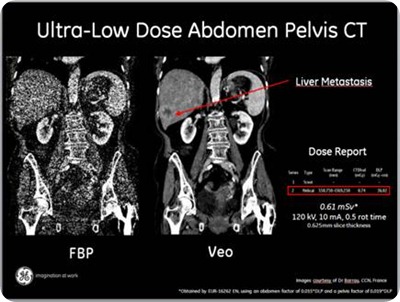Emphasizing its commitment to low-dose medical imaging, GE Healthcare today announced 510(k) clearance of its revolutionary Computed Tomography (CT) technology, called Veo,* which may help physicians deliver accurate diagnoses by enabling profound CT image clarity at dramatically lower dose. Veo represents the CT industry’s first Model-based Iterative Reconstruction (MBIR) technique, and is already available on GE Discovery CT750 HD systems in Europe, Canada and regions of Asia.
“The radiological community continues to demand maximum CT image clarity at optimized dose levels to help best serve our patients,” said Dr. William Shuman, Professor and Vice Chairman, Department of Radiology at the University of Washington. “A superb image quality, submillisievert (mSv) CT exam has in many ways been seen as CT’s holy grail – making powerful new diagnostic tools like Veo all the more vital as we seek to minimize patient dose while maximizing diagnostic confidence. The Veo reconstruction option may also improve the image quality of low dose non-diagnostic CT images (Filtered Back Projection), such that they become diagnostic.”
 In fact, Veo has already been clinically shown to offer profound image clarity at yet unseen low dose levels. Current Veo users in Europe report successful chest CTs done with an equivalent amount of medical radiation dose as a chest x-ray, or less than one-tenth of one mSv.2 “With a clinical chest CT at 0.05 mSv, we produced images where we could see and analyze pathology,” said Professor Johan de Mey, Chair of the Radiology Department at University Hospital in Brussels, Belgium. “With Veo, we can conduct lower dose CT scans in children, too, and this is particularly important in groups that require continued follow-up, such as those with cystic fibrosis or lymphoma.”
In fact, Veo has already been clinically shown to offer profound image clarity at yet unseen low dose levels. Current Veo users in Europe report successful chest CTs done with an equivalent amount of medical radiation dose as a chest x-ray, or less than one-tenth of one mSv.2 “With a clinical chest CT at 0.05 mSv, we produced images where we could see and analyze pathology,” said Professor Johan de Mey, Chair of the Radiology Department at University Hospital in Brussels, Belgium. “With Veo, we can conduct lower dose CT scans in children, too, and this is particularly important in groups that require continued follow-up, such as those with cystic fibrosis or lymphoma.”
While complementing the robust imaging capabilities of GE’s advanced Adaptive Statistical Iterative Reconstruction (ASiR) technique, Veo represents a significant technological leap forward just as the topic of diagnostic medical radiation levels has come into the national spotlight. In fact, the U.S. Joint Commission’s recent Sentinel Event Alert on minimizing medical radiation specifically suggested that healthcare organizations “invest in technologies that optimize or reduce dose.”3 Veo is a first-of-its kind dose-optimizing technology, the most profound since ASiR – which, itself, was the world’s first iterative reconstruction technology and is now employed on more than 1,000 GE CT systems globally for an estimated 10 million examinations to date.
“GE is committed to equipping radiologists and technologists with breakthrough CT technologies that can help reduce patient dose and improve image clarity in their daily practice,” said Steve Gray, Vice President & General Manager of CT & Advantage Workstation for GE Healthcare. “Veo’s revolutionary capabilities change the rules of CT imaging, and represent our promise to help eliminate the traditional trade-off between image clarity and low dose levels as we help healthcare professionals offer the best patient care possible.”
GE Healthcare is coordinating a multi-center study to investigate further improvements – including substantially lower dose levels – which Veo may offer across a range of applications. Developed in partnership with leading academic researchers and experts from GE’s Global Research Center, Veo is available on the Discovery CT750 HD, a ‘healthymagination-certified’ product, meaning that it helps enable better healthcare for more people. For more information about Veo and its clinical use, see CT Clarity magazine at www.ctclarity.com, or download CT Clarity free here: http://itunes.apple.com/us/app/ge-healthcare-ct-clarity-the/id453244574?mt=8# (iPad/iPhone);
https://market.android.com/details?id=com.texterity.android.CTClarity&feature=search_result
(Droid devices).